CORPORATE ACTION: Henkel
Henkel Showcases Circular Packaging Innovations
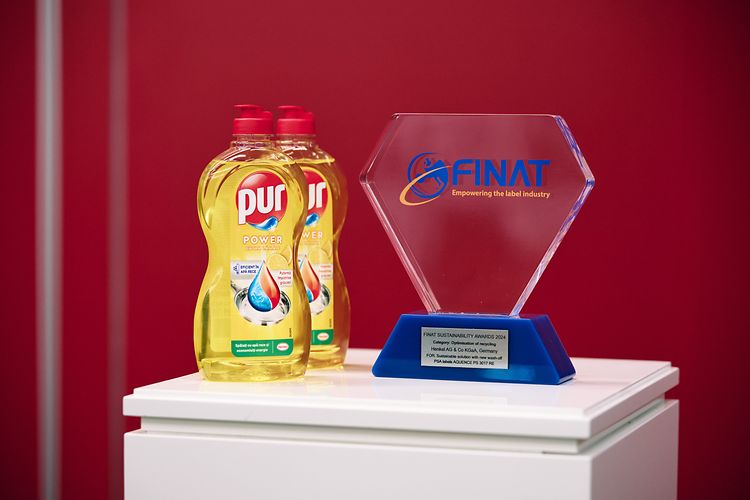 At industry events in Barcelona and Utrecht, Henkel unveiled a range of circular packaging solutions aimed at closing the loop on plastic use. Displays featured refill systems, recycled-content packaging and innovative adhesives that improve recyclability. Henkel emphasized collaboration with partners across the value chain to achieve full circularity and reduce dependency on virgin plastic. [Image Credit: © Henkel AG & Co. KGaA]
At industry events in Barcelona and Utrecht, Henkel unveiled a range of circular packaging solutions aimed at closing the loop on plastic use. Displays featured refill systems, recycled-content packaging and innovative adhesives that improve recyclability. Henkel emphasized collaboration with partners across the value chain to achieve full circularity and reduce dependency on virgin plastic. [Image Credit: © Henkel AG & Co. KGaA]
Henkel Promotes Smart Packaging Efficiency
 Henkel’s new white paper, ‘If It Doesn’t Fit, It Doesn’t Exist’, introduces Right-Sized Packaging, a customizable, automated solution for e-commerce sustainability. By tailoring packaging to product dimensions, companies can reduce empty space, filler use, CO₂ emissions and shipping costs while complying with EU waste reduction goals. Henkel emphasizes the role of advanced hot melt adhesives, which enable strong, recyclable and energy-efficient seals. Case studies show up to 52% adhesive and 42% energy savings. The white paper guides businesses on achieving cost-effective, eco-friendly packaging processes that enhance customer satisfaction.[Image Credit: © Henkel AG & Co. KGaA]
Henkel’s new white paper, ‘If It Doesn’t Fit, It Doesn’t Exist’, introduces Right-Sized Packaging, a customizable, automated solution for e-commerce sustainability. By tailoring packaging to product dimensions, companies can reduce empty space, filler use, CO₂ emissions and shipping costs while complying with EU waste reduction goals. Henkel emphasizes the role of advanced hot melt adhesives, which enable strong, recyclable and energy-efficient seals. Case studies show up to 52% adhesive and 42% energy savings. The white paper guides businesses on achieving cost-effective, eco-friendly packaging processes that enhance customer satisfaction.[Image Credit: © Henkel AG & Co. KGaA]
CORPORATE ACTION: Procter & Gamble
Colgate, Watsons Launch Take-Back Program
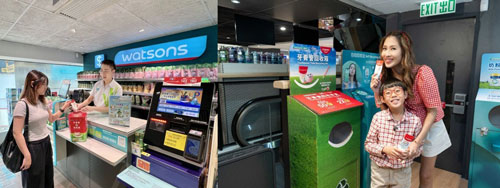 Colgate and Watsons partnered on the “Small Acts, Big Smiles” program, encouraging customers across Hong Kong to return used oral care packaging for recycling. It includes in-store collection points and aims to keep hard-to-recycle plastics out of landfills. [Image Credit: © Colgate x Watsons ]
Colgate and Watsons partnered on the “Small Acts, Big Smiles” program, encouraging customers across Hong Kong to return used oral care packaging for recycling. It includes in-store collection points and aims to keep hard-to-recycle plastics out of landfills. [Image Credit: © Colgate x Watsons ]
P&G Progresses Toward 2030 Packaging Goals
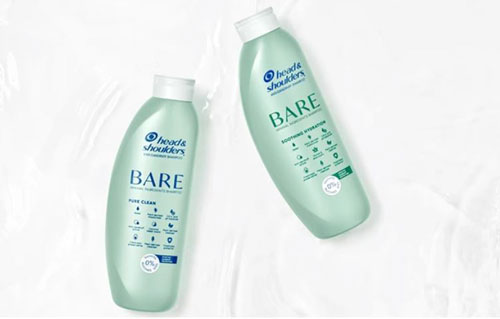 Procter & Gamble reported steady progress toward its 2030 packaging sustainability goals, despite persistent challenges in eliminating flexible plastics. During its annual shareholder meeting, a proposal urging stronger commitments on flexible packaging failed to gain approval, but the company reaffirmed its dedication to reducing virgin plastic use and expanding recyclable formats. P&G says it continues to invest in material innovation and circular systems to meet consumer and environmental expectations. [Image Credit: © Procter & Gamble]
Procter & Gamble reported steady progress toward its 2030 packaging sustainability goals, despite persistent challenges in eliminating flexible plastics. During its annual shareholder meeting, a proposal urging stronger commitments on flexible packaging failed to gain approval, but the company reaffirmed its dedication to reducing virgin plastic use and expanding recyclable formats. P&G says it continues to invest in material innovation and circular systems to meet consumer and environmental expectations. [Image Credit: © Procter & Gamble]
P&G Advances Eco Packaging Partnerships
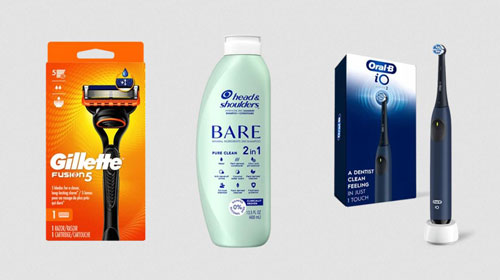 Procter & Gamble is highlighting its ongoing collaborations with organizations such as WWF to accelerate sustainable packaging innovation. Through new material trials, circular economy partnerships and improved recyclability standards, P&G aims to reduce plastic waste and boost transparency in its supply chain. It’s testing refill formats and paper-based alternatives while developing packaging that’s easier to recover and reuse. [Image Credit: © Procter & Gamble]
Procter & Gamble is highlighting its ongoing collaborations with organizations such as WWF to accelerate sustainable packaging innovation. Through new material trials, circular economy partnerships and improved recyclability standards, P&G aims to reduce plastic waste and boost transparency in its supply chain. It’s testing refill formats and paper-based alternatives while developing packaging that’s easier to recover and reuse. [Image Credit: © Procter & Gamble]
P&G And Lindner Advance Plastic Recycling
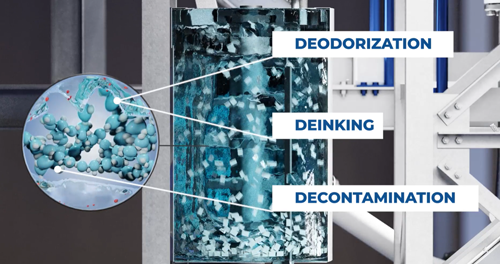 Procter & Gamble and Lindner Group unveiled Flexloop, a solvent-based recycling system designed to clean and reuse polyolefin films without degrading their quality. Developed from P&G’s lab innovations, Flexloop removes contaminants, inks and odors from used packaging, producing high-purity recycled plastic. The modular system integrates with existing recycling lines, offering recyclers an alternative to conventional mechanical recycling. [Image Credit: © Lindner/Procter & Gamble]
Procter & Gamble and Lindner Group unveiled Flexloop, a solvent-based recycling system designed to clean and reuse polyolefin films without degrading their quality. Developed from P&G’s lab innovations, Flexloop removes contaminants, inks and odors from used packaging, producing high-purity recycled plastic. The modular system integrates with existing recycling lines, offering recyclers an alternative to conventional mechanical recycling. [Image Credit: © Lindner/Procter & Gamble]
CORPORATE ACTION: Other
SC Johnson CEO Calls for Plastic Regulation
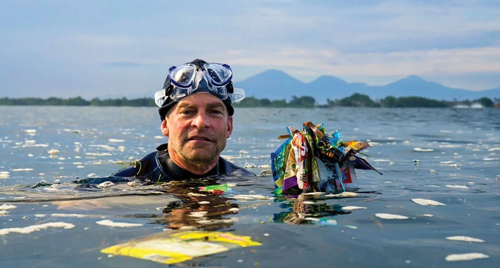 In an interview, SC Johnson CEO Fisk Johnson urged governments to impose stronger regulations on plastic waste, arguing that voluntary efforts alone cannot solve the crisis. Johnson emphasized that consistent global rules would help level the playing field and accelerate corporate investment in recycling and reuse systems. The company has introduced several refill initiatives but says systemic change requires policy intervention. [Image Credit: © S.C. Johnson & Son, Inc.]
In an interview, SC Johnson CEO Fisk Johnson urged governments to impose stronger regulations on plastic waste, arguing that voluntary efforts alone cannot solve the crisis. Johnson emphasized that consistent global rules would help level the playing field and accelerate corporate investment in recycling and reuse systems. The company has introduced several refill initiatives but says systemic change requires policy intervention. [Image Credit: © S.C. Johnson & Son, Inc.]
Refill Shopping Gains Ground
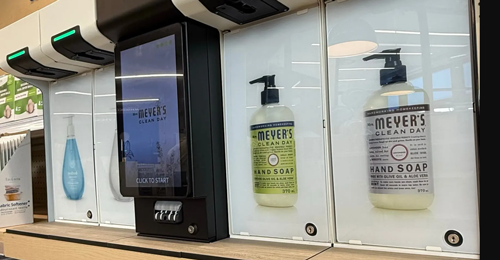 SC Johnson is encouraging consumers to “put refills on their shopping list” through a blog campaign promoting reusable packaging for household staples. The company spotlights its refill-ready brands like Windex and Mrs. Meyer’s as part of a wider move to normalize refill culture. By connecting everyday consumer habits to environmental impact, the campaign aims to help consumers bridge the between gap intent and action, arguing that refill systems aren’t usually built with “real life in mind”, after “decades of designing products for single use”.[Image Credit: © S.C. Johnson & Son, Inc.]
SC Johnson is encouraging consumers to “put refills on their shopping list” through a blog campaign promoting reusable packaging for household staples. The company spotlights its refill-ready brands like Windex and Mrs. Meyer’s as part of a wider move to normalize refill culture. By connecting everyday consumer habits to environmental impact, the campaign aims to help consumers bridge the between gap intent and action, arguing that refill systems aren’t usually built with “real life in mind”, after “decades of designing products for single use”.[Image Credit: © S.C. Johnson & Son, Inc.]
Gaming For A Greener Future
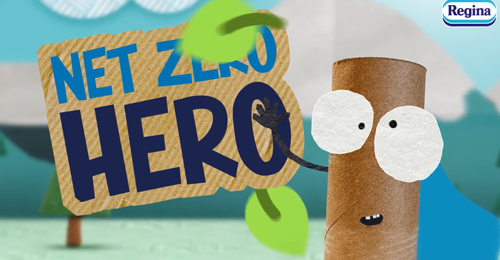 UK household paper brand Regina’s ‘Net Zero Hero’ is a nostalgic, gaming-inspired campaign encouraging families to live sustainably. Developed with agencies Five by Five and Gamify, the online mini-game follows Rolly through challenges on reducing water, plastic and carbon emissions. Players completing the game can enter a prize draw for eco-themed getaways. It’s supported by Tesco, Asda and Sainsbury’s and aims to educate while positioning Regina as a leading sustainable choice in household paper products.[Image Credit: © SOFIDEL/LBB Ltd]
UK household paper brand Regina’s ‘Net Zero Hero’ is a nostalgic, gaming-inspired campaign encouraging families to live sustainably. Developed with agencies Five by Five and Gamify, the online mini-game follows Rolly through challenges on reducing water, plastic and carbon emissions. Players completing the game can enter a prize draw for eco-themed getaways. It’s supported by Tesco, Asda and Sainsbury’s and aims to educate while positioning Regina as a leading sustainable choice in household paper products.[Image Credit: © SOFIDEL/LBB Ltd]
CAMPAIGNS, COMMITMENTS & NGOs
Smartfill Dispensers Cut Plastic And Prices
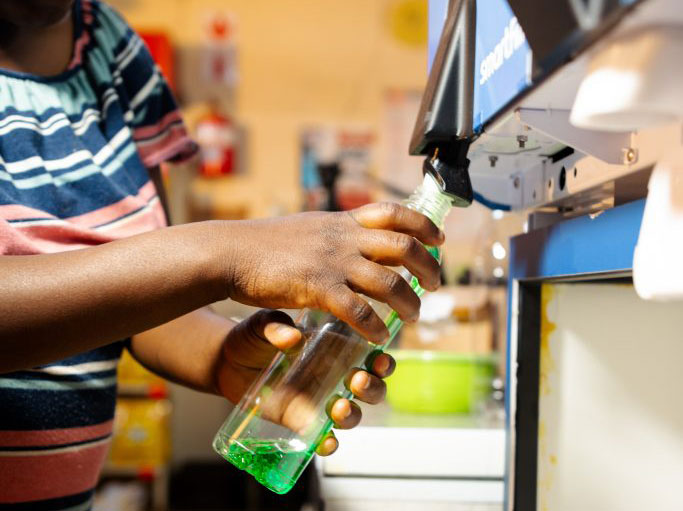
Smartfill’s refill dispensers in South Africa’s township shops allow customers to buy essentials in precise amounts at prices up to 50% lower than major supermarkets. The system targets the informal sector, a significant channel for the country’s FMCG sector. Smartfill aims to work with the spaza shops rather than compete against them.[Image Credit: © Smartfill]
Bottles For Good Promotes Nationwide Refills
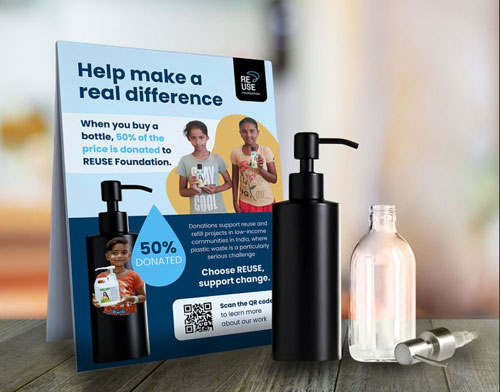
The UK’s “Bottles for Good” campaign from UK charity REUSE Foundation, in collaboration with refill stores and mobile refill services, aims to inspire citizens to embrace refill culture and reduce single-use plastic waste. Participating stores receive free refillable bottles; the stores donate 50% of the proceeds to the charity to fund its work supporting reuse and female-empowerment, including the Beat The Sachet initiative in India. [Image Credit: © REUSE Foundation]
Reyplast’s “New Creatures of the Sea” Campaign
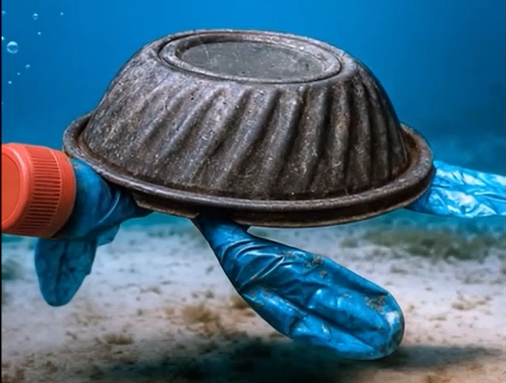
Peruvian household goods brand Reyplast launched “New Creatures of the Sea,” a campaign dramatizing ocean pollution through imaginative, hybrid sea creatures made of plastic waste. The campaign blends digital and film media to provoke awareness about marine plastic contamination, highlighting the finding that almost 70% of Peru’s beach waste is plastic. [Image Credit: © ReyPlast/ Webtilia]
PACKAGING REDESIGNS
Amcor’s Refillable Shampoo Stick Improves Recyclability
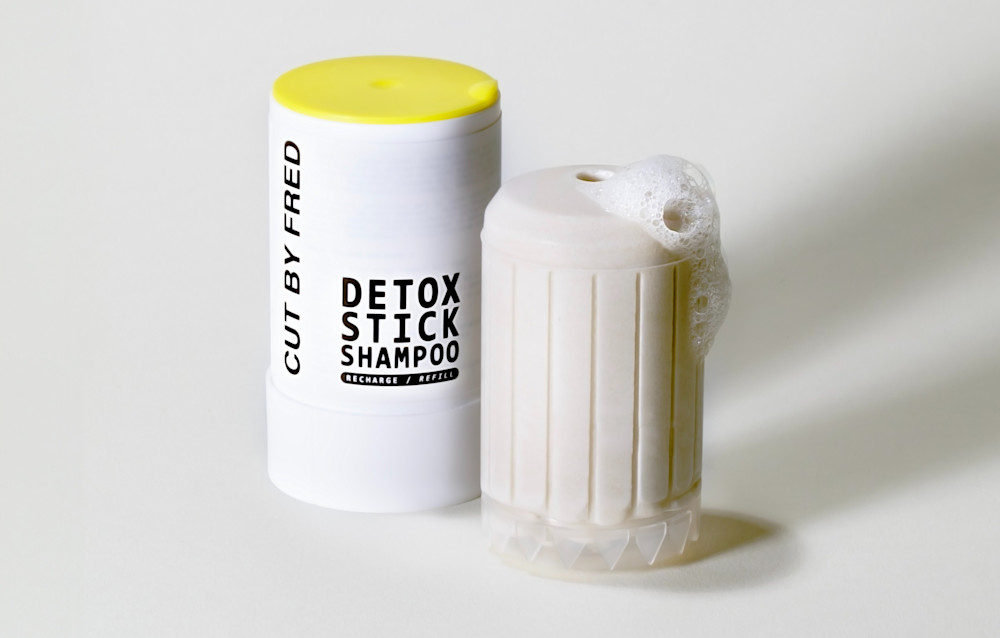 Amcor partnered with French brand Cut by Fred to introduce a refillable shampoo stick designed to eliminate single-use plastic. Made from PP, Amcor says the stick and refill are recyclable, and the refillable pack fits into the original packaging. Cut’s original packaging required users to melt a refill in a microwave before transferring it to the container, which had to be put in fridge to solidify.[Image Credit: © Amcor plc ]
Amcor partnered with French brand Cut by Fred to introduce a refillable shampoo stick designed to eliminate single-use plastic. Made from PP, Amcor says the stick and refill are recyclable, and the refillable pack fits into the original packaging. Cut’s original packaging required users to melt a refill in a microwave before transferring it to the container, which had to be put in fridge to solidify.[Image Credit: © Amcor plc ]
POLICY, REGULATION & LEGAL
California’s EPR Program Faces Regulatory Confusion
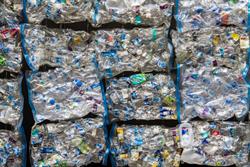 California’s Extended Producer Responsibility law continues to face regulatory uncertainty. Stakeholders from government, industry and environmental groups are struggling to align on implementation rules for SB 54. Businesses are wary of unclear compliance expectations and potential cost impacts. Despite the confusion, the initiative is seen as a landmark step toward producer-led plastic reduction in the United States.[Image Credit: © Nick Fewings on Unsplash]
California’s Extended Producer Responsibility law continues to face regulatory uncertainty. Stakeholders from government, industry and environmental groups are struggling to align on implementation rules for SB 54. Businesses are wary of unclear compliance expectations and potential cost impacts. Despite the confusion, the initiative is seen as a landmark step toward producer-led plastic reduction in the United States.[Image Credit: © Nick Fewings on Unsplash]
Philadelphia Challenges Misleading Recyclability Claims
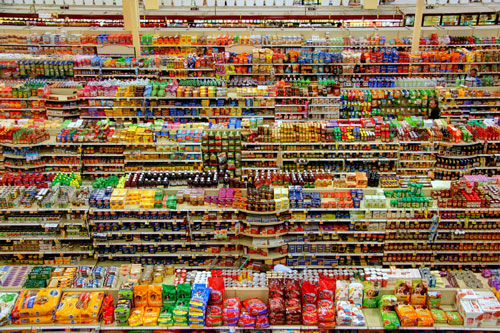
Philadelphia city sued major consumer brands including SC Johnson for allegedly misleading consumers about the recyclability of their plastic packaging. Officials seek accountability under local consumer protection laws and the case could set a national precedent, pushing companies to provide more honest labeling and invest in truly recyclable packaging. [Image Credit: © Peter Bond on Unsplash]
INNOVATION & TECHNOLOGY
Luxe Pack Showcases Eco Packaging Breakthroughs
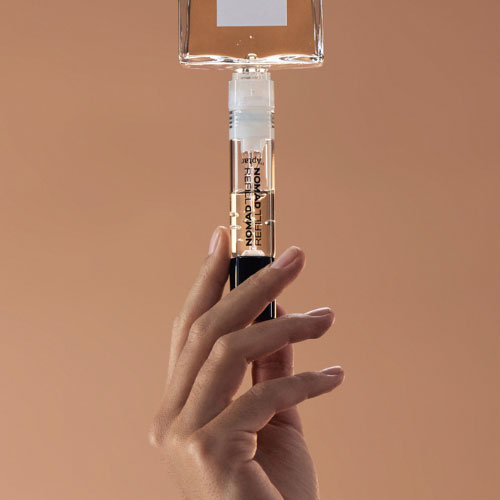
At Luxe Pack Monaco 2025, luxury brands unveiled cutting-edge packaging innovations focused on sustainability. Highlights included refillable perfume systems, recyclable bioplastics and compostable alternatives for cosmetics. Many exhibitors emphasized the balance between premium aesthetics and environmental responsibility. By embedding eco-design into high-end products, brands signal that sustainability is no longer a niche concern but a defining factor in the future of beauty packaging.[Image Credit: © AptarGroup, Inc.]
OTHER NEWS
UK Plastic Waste Exports Surge 84%
.jpg&width=250&height=188) New data reveals that the UK’s plastic waste exports to developing nations jumped 84% in a single year, much ending up in countries lacking proper recycling infrastructure, especially Indonesia and Malaysia, increasing the risk of pollution and illegal dumping. Critics argue this undermines the UK’s domestic recycling commitments and shifts the burden to poorer regions. Campaigners are calling for tighter export regulations and investment in onshore recycling, similar to the ban the EU is implementing from next year. [Image Credit: © vianet ramos on Unsplash]
New data reveals that the UK’s plastic waste exports to developing nations jumped 84% in a single year, much ending up in countries lacking proper recycling infrastructure, especially Indonesia and Malaysia, increasing the risk of pollution and illegal dumping. Critics argue this undermines the UK’s domestic recycling commitments and shifts the burden to poorer regions. Campaigners are calling for tighter export regulations and investment in onshore recycling, similar to the ban the EU is implementing from next year. [Image Credit: © vianet ramos on Unsplash]
Copyright 2026 Business360, Inc.

